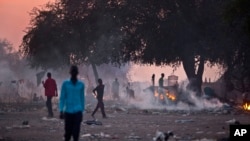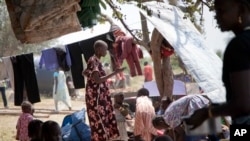NIMULE, SOUTH SUDAN —
Diing Kon has a wish: to be able to fall asleep at night without feeling the fear that grips her gut when she hears gunfire nearby.
The mother of eight has spent her entire life in Bor, the only town in South Sudan still under rebel control after government forces recaptured Bentiu, the capital of oil-producing Unity state, last week, after a bloody battle.
The next target of South Sudanese troops would be Bor, a spokesman for the army said, presaging heavy fighting in the capital of Jonglei state.
But Kon left her hometown weeks ago, when rebels overran Bor. She and her children came under fire as they crossed the Nile River by boat, leaving behind everything but each other.
They eventually ended up at the Dzaipi transit camp in northern Uganda, with "no luggage, no shoes for the children, no utensils," Kon told VOA.
The camp is around an hour's drive from the South Sudanese border town of Nimule, and around 390 kilometers from Bor.
"We are looking for a place to stay because I have never been in exile before. I don’t know where my husband is... He ran away," Kon said.
At least 32,000 South Sudanese have fled to neighboring countries to escape deadly clashes that erupted in the world's newest nation four weeks ago, the United Nations' refugee agency (UNHCR) has said.
The bulk of the refugees -- more than 23,000 -- have gone to Uganda and continue to cross into the country at the rate of around 3,000 a day.
Once in Uganda, the refugees have to be registered by the U.N. refugee agency before they can be moved to settlement camps where they can build homes, grow their own food, sell the surplus and become self-sufficient.
Philip Mabior, a school teacher from Bor, who fled the town nearly a month ago, has already been registered as a refugee.
But at the beginning of this week, Mabior, his mother and sisters were still at the transit camp, where he described sanitary services as "very limited."
"For example, you have to line up at a four-door latrine to ease yourself. There is limited water supply. Sometimes people take a day or two without bathing," Mabior said, adding that he was
Officials from the UN refugee agency, the UNHCR, are being very methodical about registering the South Sudanese who are crossing into Uganda at a rate of around 3,000 a day.
UNHCR officials told VOA they want to make sure they don't register the same refugee multiple times -- but the refugees themselves say the process is too slow, especially given the conditions at transit camps like Dzaipi.
Tabitha Ayen and her seven children have been at Dzaipi for six days, waiting to be registered as refugees so that they can move to a settlement camp.
Ayen said that, for the entire time she's been at the transit camp, she hasn't been given any food or water by aid agencies and she and her family have been sleeping outdoors.
Thousands of South Sudanese who have fled the violence that broke out on Dec.15 in Juba and quickly spread around the country, staged a protest in a transit camp in northern Uganda at the weekend, demanding that the registration process be speeded up so that they can be moved to settlement camps.
In response, the Ugandan authorities set up a new transit camp, which within a day of being opened had taken in around 1,000 South Sudanese running from the violence in the world's newest nation that the United Nations said has likely claimed some 10,000 lives in four weeks, and displaced hundreds of thousands more.
People continued to flee the country in their droves, even as representatives for the two main protagonists in the fighting -- President Salva Kiir and his former Vice President Riek Machar -- met in Addis Ababa to try to resolve the conflict.
The mother of eight has spent her entire life in Bor, the only town in South Sudan still under rebel control after government forces recaptured Bentiu, the capital of oil-producing Unity state, last week, after a bloody battle.
The next target of South Sudanese troops would be Bor, a spokesman for the army said, presaging heavy fighting in the capital of Jonglei state.
But Kon left her hometown weeks ago, when rebels overran Bor. She and her children came under fire as they crossed the Nile River by boat, leaving behind everything but each other.
They eventually ended up at the Dzaipi transit camp in northern Uganda, with "no luggage, no shoes for the children, no utensils," Kon told VOA.
The camp is around an hour's drive from the South Sudanese border town of Nimule, and around 390 kilometers from Bor.
"We are looking for a place to stay because I have never been in exile before. I don’t know where my husband is... He ran away," Kon said.
At least 32,000 South Sudanese have fled to neighboring countries to escape deadly clashes that erupted in the world's newest nation four weeks ago, the United Nations' refugee agency (UNHCR) has said.
The bulk of the refugees -- more than 23,000 -- have gone to Uganda and continue to cross into the country at the rate of around 3,000 a day.
Once in Uganda, the refugees have to be registered by the U.N. refugee agency before they can be moved to settlement camps where they can build homes, grow their own food, sell the surplus and become self-sufficient.
Philip Mabior, a school teacher from Bor, who fled the town nearly a month ago, has already been registered as a refugee.
But at the beginning of this week, Mabior, his mother and sisters were still at the transit camp, where he described sanitary services as "very limited."
"For example, you have to line up at a four-door latrine to ease yourself. There is limited water supply. Sometimes people take a day or two without bathing," Mabior said, adding that he was
Officials from the UN refugee agency, the UNHCR, are being very methodical about registering the South Sudanese who are crossing into Uganda at a rate of around 3,000 a day.
UNHCR officials told VOA they want to make sure they don't register the same refugee multiple times -- but the refugees themselves say the process is too slow, especially given the conditions at transit camps like Dzaipi.
Six days without food
Tabitha Ayen and her seven children have been at Dzaipi for six days, waiting to be registered as refugees so that they can move to a settlement camp.
Ayen said that, for the entire time she's been at the transit camp, she hasn't been given any food or water by aid agencies and she and her family have been sleeping outdoors.
Thousands of South Sudanese who have fled the violence that broke out on Dec.15 in Juba and quickly spread around the country, staged a protest in a transit camp in northern Uganda at the weekend, demanding that the registration process be speeded up so that they can be moved to settlement camps.
In response, the Ugandan authorities set up a new transit camp, which within a day of being opened had taken in around 1,000 South Sudanese running from the violence in the world's newest nation that the United Nations said has likely claimed some 10,000 lives in four weeks, and displaced hundreds of thousands more.
People continued to flee the country in their droves, even as representatives for the two main protagonists in the fighting -- President Salva Kiir and his former Vice President Riek Machar -- met in Addis Ababa to try to resolve the conflict.





